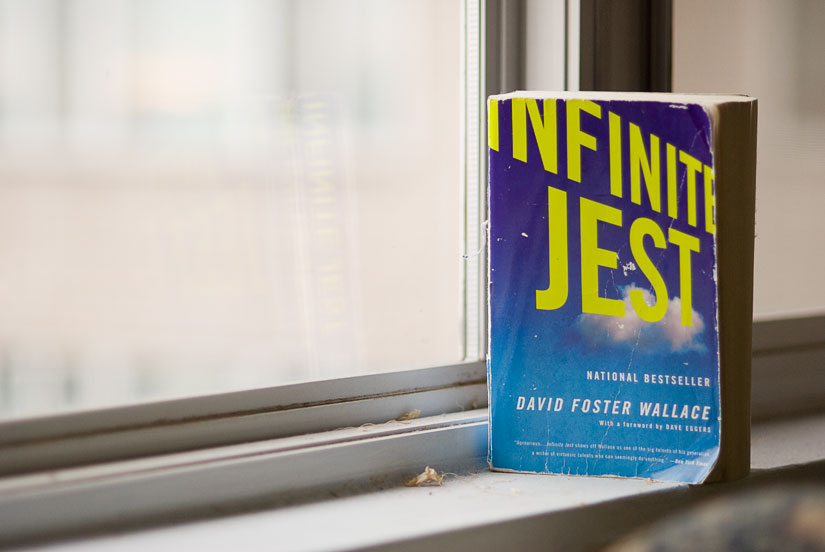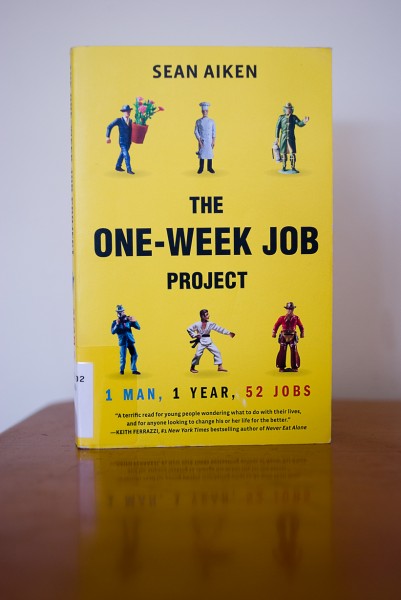
Oh
Infinite Jest. At its 1079 pages, including extensive (and mandatory) footnotes, it is by far the longest book I can discuss with any of my friends. In fact, I could theoretically discuss this book with no fewer than
four of my friends, with a fifth soon to follow (Hi
E! Don't worry, no spoilers). And yet... and yet...
Let me begin by saying that the book is highly engaging. While there were short periods where I thought I would not want to finish, most of the time the various story lines kept me fully interested. It takes a long time to read a 1k-page book, so it doesn't bother me that I was at
Infinite Jest for over two months.
Let me also say that David Foster Wallace was an immensely talented writer. I say this with some authority because I took AP English. Anyone that's gone through that gauntlet of reading has the right to give an unqualified statement about someone's writing ability.
Now I haven't gone online to do the kinds of research George found necessary after completing the book - checking the Wikipedia article, looking at timelines, etc. I will do those things shortly but wanted my opinion to be unbiased by any kind of hard-core analysis others might have accomplished for me.
Infinite Jest manages to say a lot of interesting things about the human experience - particularly with regard to entertainment and addiction. I found Wallace to be intriguingly accurate at predicting the future - about technology and about society. Written in 1996, he is spot-on with our use of technology and how it affects us. He was very sharp about human nature.
But funny? All of the critique for this book centers how how "hilarious" Wallace is. Not sure what's wrong with me, but I don't get the joke. While I found the book entertaining and sometimes amusing, I would hardly call it comic.
Also, don't expect the book to come to a beautiful conclusion with everything wrapped up nicely. I was prepared for this by reading one of Wallace's shorter novels, and the ending here was similar - you are left in a bit of a lurch, with some idea of where things are going in some story lines and completely baffled by others. The characters don't find redemption or get crushed because they deserve it. In Wallace's world, things don't get resolved because it's the end of the story. In fact, I can't really say I saw any of the characters - and there are many, many characters - really grow or change in any meaningful way. The used-to-take-AP-English essay-writer in me wants to say this directly speaks to Wallace's take on human nature.
So do I recommend the book? ::sigh:: I hate to say it, especially because several of my friends recommend it so highly, but I have to be honest: I think some of the applause for this book is really in part self-congratulatory applause, for those who managed to get through it. Like anyone that manages to stumble through
War and Peace (I am not a part of that group), they are required to sing this book's praises because otherwise they just wasted two months of their lives.
On the other hand, it was a good read. Required? Not on my list, but a good read nonetheless.
12 Books
This post comes to you as part of
E‘s
12 books in 12 months project. The goal is to read
12 books in a year –
12 books that we might not ordinarily be too motivated to read, but that have been on our to-read list. Not sure which of the remaining 9 I will tackle next, but I guarantee it will be one of the easy books.
1.
Story of O, Pauline Reage
2.
The Four Hour Workweek, Tim Ferris
3.
Sex at Dawn: The Prehistoric Origins of Modern Sexuality, Christopher Ryan and Cacilda Jethá
4.
The One-Week Job Project, Sean Aiken
5.
Infinite Jest, David Foster Wallace
6.
Surely You’re Joking, Mr. Feynman?, Richard Feynman
7.
Portrait of the Artist as a Young Man, James Joyce
8.
Light in August, William Faulkner
9.
For Whom the Bell Tolls, Ernest Hemingway
10. At least one book from my photography collection, TBD.
11.
Year of Magical Thinking, Joan Didion
12.
A Scanner Darkly, Philip K. Dick
 Oh Infinite Jest. At its 1079 pages, including extensive (and mandatory) footnotes, it is by far the longest book I can discuss with any of my friends. In fact, I could theoretically discuss this book with no fewer than four of my friends, with a fifth soon to follow (Hi E! Don't worry, no spoilers). And yet... and yet...
Let me begin by saying that the book is highly engaging. While there were short periods where I thought I would not want to finish, most of the time the various story lines kept me fully interested. It takes a long time to read a 1k-page book, so it doesn't bother me that I was at Infinite Jest for over two months.
Let me also say that David Foster Wallace was an immensely talented writer. I say this with some authority because I took AP English. Anyone that's gone through that gauntlet of reading has the right to give an unqualified statement about someone's writing ability.
Now I haven't gone online to do the kinds of research George found necessary after completing the book - checking the Wikipedia article, looking at timelines, etc. I will do those things shortly but wanted my opinion to be unbiased by any kind of hard-core analysis others might have accomplished for me.
Infinite Jest manages to say a lot of interesting things about the human experience - particularly with regard to entertainment and addiction. I found Wallace to be intriguingly accurate at predicting the future - about technology and about society. Written in 1996, he is spot-on with our use of technology and how it affects us. He was very sharp about human nature.
But funny? All of the critique for this book centers how how "hilarious" Wallace is. Not sure what's wrong with me, but I don't get the joke. While I found the book entertaining and sometimes amusing, I would hardly call it comic.
Also, don't expect the book to come to a beautiful conclusion with everything wrapped up nicely. I was prepared for this by reading one of Wallace's shorter novels, and the ending here was similar - you are left in a bit of a lurch, with some idea of where things are going in some story lines and completely baffled by others. The characters don't find redemption or get crushed because they deserve it. In Wallace's world, things don't get resolved because it's the end of the story. In fact, I can't really say I saw any of the characters - and there are many, many characters - really grow or change in any meaningful way. The used-to-take-AP-English essay-writer in me wants to say this directly speaks to Wallace's take on human nature.
So do I recommend the book? ::sigh:: I hate to say it, especially because several of my friends recommend it so highly, but I have to be honest: I think some of the applause for this book is really in part self-congratulatory applause, for those who managed to get through it. Like anyone that manages to stumble through War and Peace (I am not a part of that group), they are required to sing this book's praises because otherwise they just wasted two months of their lives.
On the other hand, it was a good read. Required? Not on my list, but a good read nonetheless.
Oh Infinite Jest. At its 1079 pages, including extensive (and mandatory) footnotes, it is by far the longest book I can discuss with any of my friends. In fact, I could theoretically discuss this book with no fewer than four of my friends, with a fifth soon to follow (Hi E! Don't worry, no spoilers). And yet... and yet...
Let me begin by saying that the book is highly engaging. While there were short periods where I thought I would not want to finish, most of the time the various story lines kept me fully interested. It takes a long time to read a 1k-page book, so it doesn't bother me that I was at Infinite Jest for over two months.
Let me also say that David Foster Wallace was an immensely talented writer. I say this with some authority because I took AP English. Anyone that's gone through that gauntlet of reading has the right to give an unqualified statement about someone's writing ability.
Now I haven't gone online to do the kinds of research George found necessary after completing the book - checking the Wikipedia article, looking at timelines, etc. I will do those things shortly but wanted my opinion to be unbiased by any kind of hard-core analysis others might have accomplished for me.
Infinite Jest manages to say a lot of interesting things about the human experience - particularly with regard to entertainment and addiction. I found Wallace to be intriguingly accurate at predicting the future - about technology and about society. Written in 1996, he is spot-on with our use of technology and how it affects us. He was very sharp about human nature.
But funny? All of the critique for this book centers how how "hilarious" Wallace is. Not sure what's wrong with me, but I don't get the joke. While I found the book entertaining and sometimes amusing, I would hardly call it comic.
Also, don't expect the book to come to a beautiful conclusion with everything wrapped up nicely. I was prepared for this by reading one of Wallace's shorter novels, and the ending here was similar - you are left in a bit of a lurch, with some idea of where things are going in some story lines and completely baffled by others. The characters don't find redemption or get crushed because they deserve it. In Wallace's world, things don't get resolved because it's the end of the story. In fact, I can't really say I saw any of the characters - and there are many, many characters - really grow or change in any meaningful way. The used-to-take-AP-English essay-writer in me wants to say this directly speaks to Wallace's take on human nature.
So do I recommend the book? ::sigh:: I hate to say it, especially because several of my friends recommend it so highly, but I have to be honest: I think some of the applause for this book is really in part self-congratulatory applause, for those who managed to get through it. Like anyone that manages to stumble through War and Peace (I am not a part of that group), they are required to sing this book's praises because otherwise they just wasted two months of their lives.
On the other hand, it was a good read. Required? Not on my list, but a good read nonetheless.
